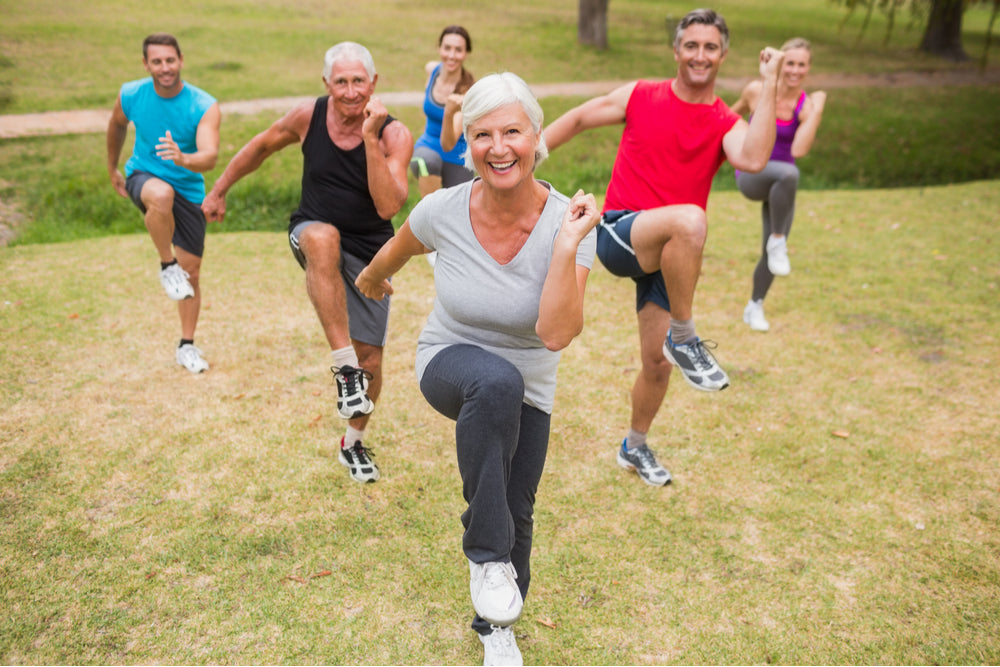Want to spend some quality time with your loved ones, and also help improve their health and mobility? Try exercising together!
According to the Centers for Disease Control and Prevention (CDC), an estimated 80% of us do not get enough exercise. In the case of our elderly loved ones, they often tend to slow down and adopt a more sedentary lifestyle. This may be due to health issues, problems with weight or pain management, lack of temperament, or fear of injury. But on the contrary, the importance of maintaining a healthy and active lifestyle during old age cannot be stressed enough!
Most adults above the age of 65 years need to exercise safely. This also includes those with chronic illnesses, such as heart disease, diabetes, high blood pressure, and arthritis. Many of these health conditions can significantly improve with exercise.
Importance of Exercising For the Elderly
Getting a move on can help seniors feel energetic and maintain independence. For those experiencing issues related to cognitive decline, regular exercise can be a great way to improve memory and mood. Overall, the benefits of exercising for the elderly include:
- Improving general health and fitness
- Improving balance and preventing potential accidents and falls.
- Delaying onset of diseases – heart disease, osteoporosis, diabetes.
- Improving cognitive function and fighting off depression.
How Often Should the Elderly Exercise?
For seniors aged 65 and older, about 2.5 hours of moderate aerobic exercise each week is recommended – about 30 minutes every day , or on most days when they feel up to it. For those who are willing to give in a bit more, an hour and 15 minutes of vigorous exercise every week is suitable. Apart from this, caregivers should work on improving flexibility and balance every day.
Exercising with Loved Ones – Tips for Caregivers
Here are ways to exercise with your loved ones and turn it into an enjoyable experience for both of you!
Before doing anything, always consult with a physician – a new exercise regime could worsen certain health conditions for some seniors. If the physician says they’re healthy enough to exercise, ask them to draft a program that you and your loved ones could practice together. Or, you could make suggestions and see if the physician thinks they’re okay.
Encourage those with cognitive decline to exercise – it helps if you don’t call it exercise and refer to it as a super fun activity like ‘dancing’ or ‘going site-seeing’. Also remember that loved ones struggling with memory issues could forget to exercise on their own and could also forget the steps and sequences. Be patient; slow down the pace, demonstrate the movements so they can mimic them, and help out otherwise when they need it.
It could also help if you purchase the every-friendly and ever-interactive American Lifetime Day Clock. Its large illuminated display will help your loved ones read the time clearly from every angle and up to 20 feet away, making it easier for them to time their exercise routine. If you can’t make it to an exercise session, you could use the multi-functioning alarm function to set a reminder for your loved ones to start the session themselves. The clock spells out all important information in large fonts, such as the day, month, year, and even ‘Afternoon’ or ‘Morning’, so you can be sure they’re not exercising at the wrong time of the day!
Simply plug the American Lifetime Day Clock, and make your exercise sessions comfortable and manageable for your loved ones!
You can also exercise indoors – that doesn’t mean you have to make the sessions lengthy and boring. Ask your loved ones for their preferences and ideas and personalize the routines to make them more enjoyable. For instance, you could adapt certain outdoor exercises for the indoors, and could also do certain activities in groups with other family members.
Some examples of physical activities you can do together include:
- Walking – serene nature walks, or even strolls around the house or yard would do!
- Yoga
- Dancing
- Bike riding (if considered safe)
- Golfing
- Gardening
- Walking a pet
- Sightseeing around town
 Fast, Free Shipping On All Orders
Fast, Free Shipping On All Orders 
